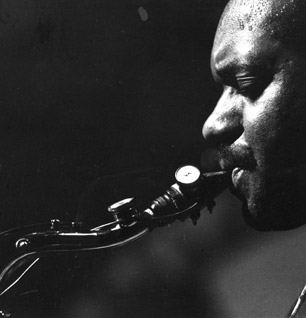| B i o g r a p h y |
 "Throughout his career, Eddie Harris was a tireless experimenter, a one-of-a-kind, nonconformist, multi-instrumentalist."
"Throughout his career, Eddie Harris was a tireless experimenter, a one-of-a-kind, nonconformist, multi-instrumentalist."
Paul de Barros
Eddie Harris was born in
Chicago in 1935. He studied piano at home and attended the famous Du
Sable High School, under the direction of Capt. Walter Dyett, where he
learned to play vibes. He made his professional debut as a pianist,
with Gene Ammons. Harris first played in the bop style, but his
interest in employing novel methods and reaching larger audiences made
itself apparent soon after he finished military service in 1961. His
first recording, the theme from the film Exodus, sold more than two
million copies and marked the start of a highly prolific and
stylistically diverse career. Until 1965 he played mainly conventional,
acoustic music; among his recordings was Freedom Jazz Dance, which
became a standard after it was recorded by Miles Davis.
In 1966 Harris adopted the electric tenor saxophone; this was a conventional instrument played through a signal processor, the Varitone. Thereafter he recorded on a variety of instruments which were modified by alterations to their structures and often played through amplifiers and signal processors. Harris played the trumpet and trombone fitted with reed mouthpieces, and saxophones fitted with brass mouthpieces. From the late 1960s he worked mostly as the leader of small groups, recording with many distinguished sidemen including Cedar Walton, Ron Carter, Muhal Richard Abrams, and Tete Montoliu.
In 1969 he joined Les McCann's soul-jazz group, with which he gave
an acclaimed performance at the Montreux International Jazz Festival.
He made his most dramatic and controversial departure from the jazz
tradition when he recorded the album Eddie Harris in the UK with the
rock musicians Steve Winwood and Jeff Beck. Though in the mid-1970s
Harris returned temporarily to a purer bop style, he contined to
experiment with unusual instruments into the 1980s.
His work as a theme composer tended to err on the dull side, notably
the background music for the Cosby Show. In the early 90s he returned
to a more authentic jazz style, but still played on altered
instruments. In his later years he produced some fine work with John
Scofield and reunited with Les McCann, whom he worked with in the early
60s. In the latter half of his career, Harris incorporated vocals into
his act, as well as stand-up comedy. His recorded output was huge, and
uneven. He died in Los Angeles in 1996.
MARK GILBERT, The New Grove Dictionary of Jazz